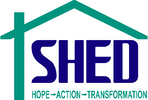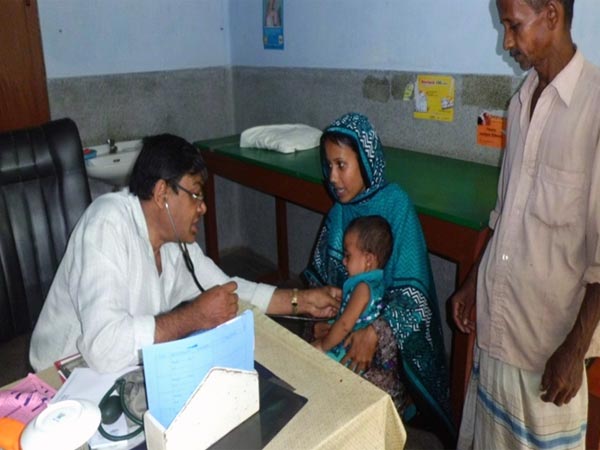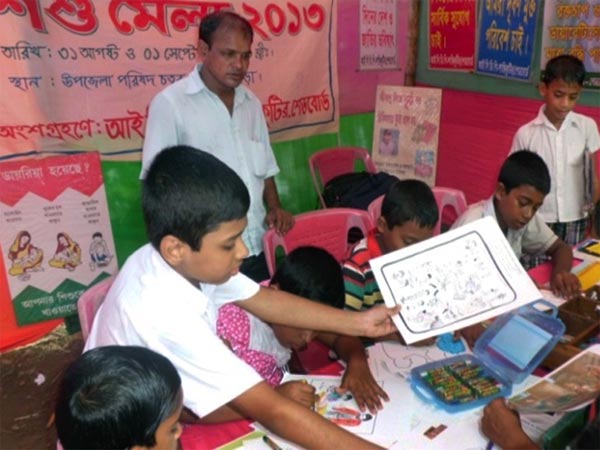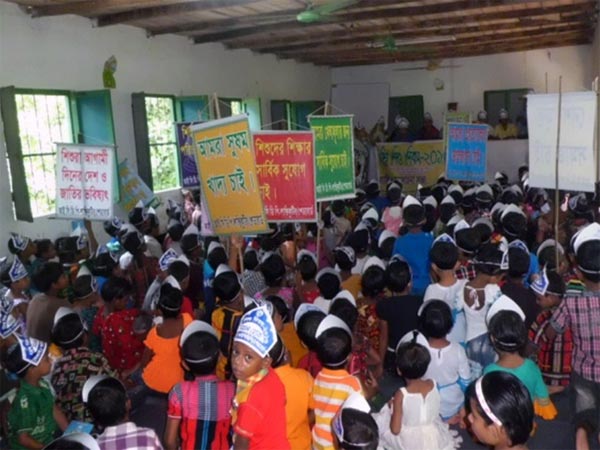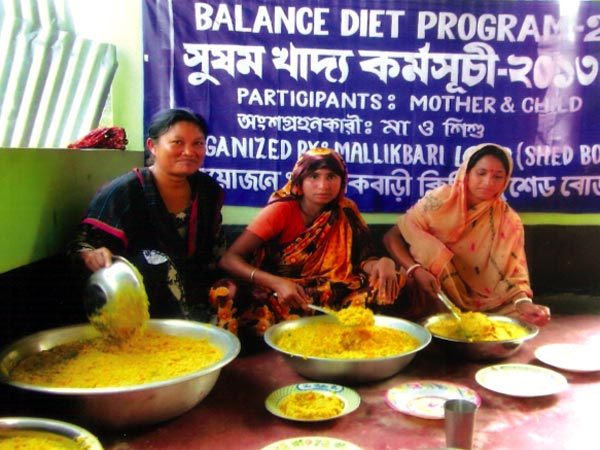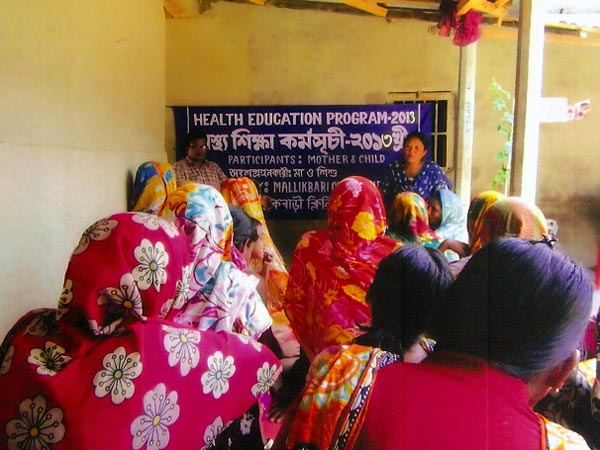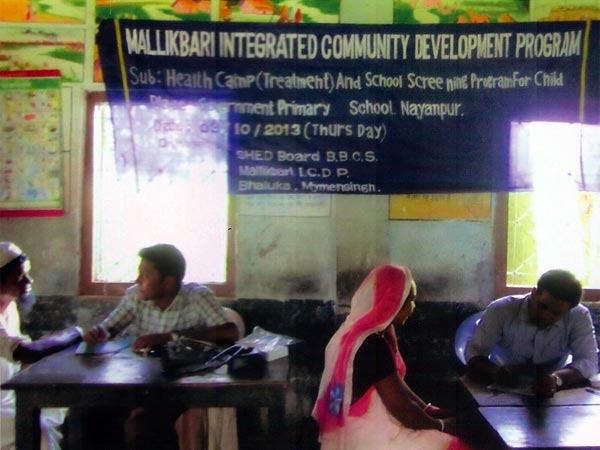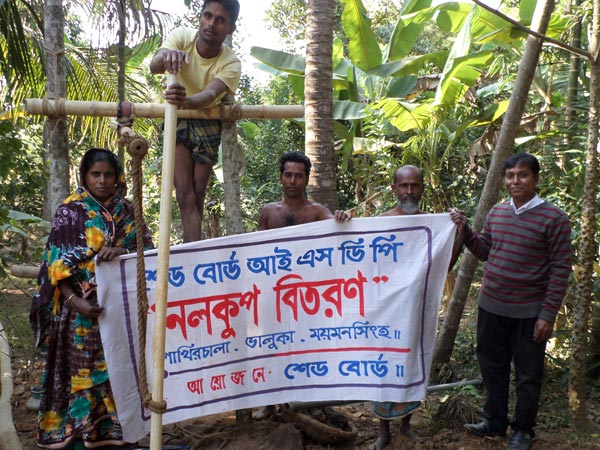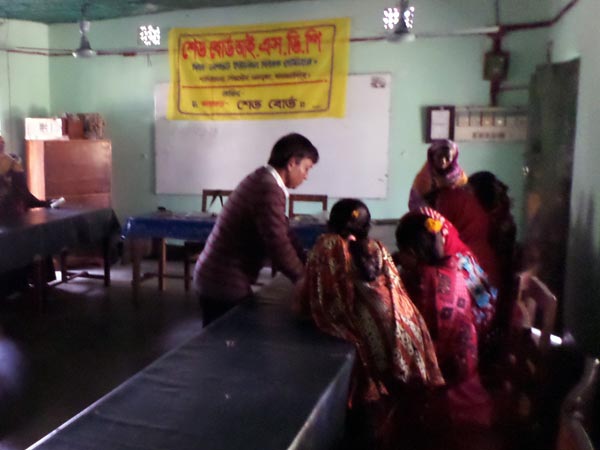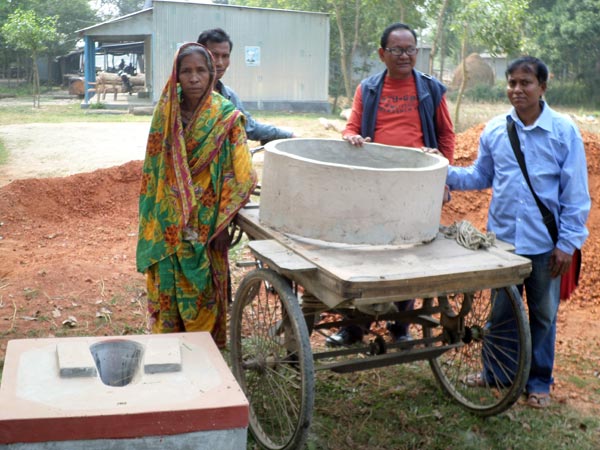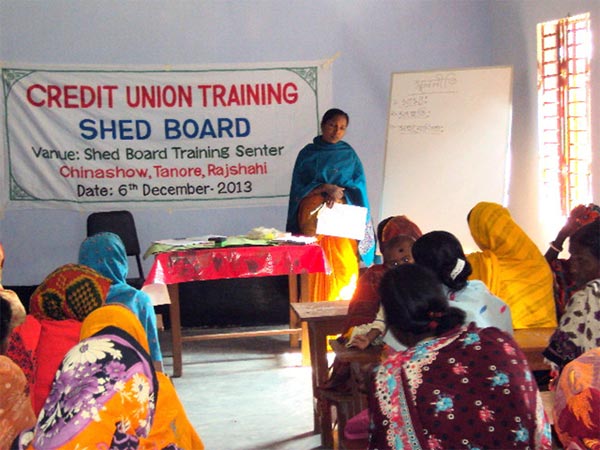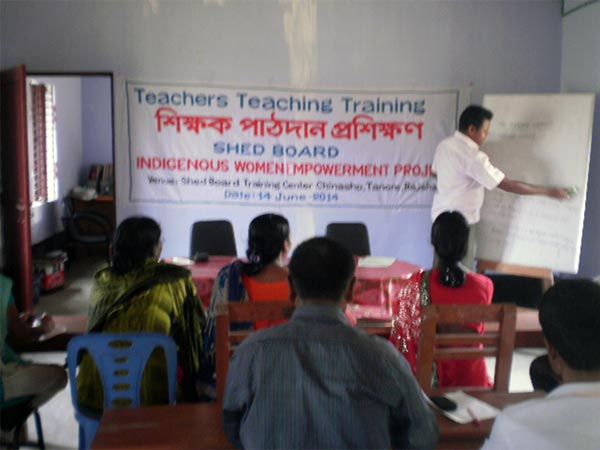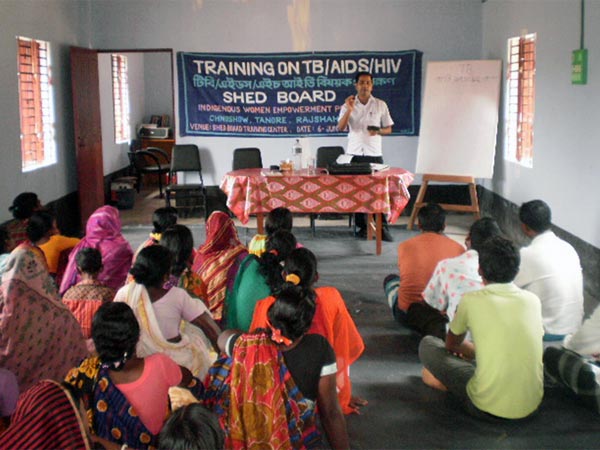Integrated Community Development Programme ICDP
Shantikutir
Over the last few years health care in Bangladesh has gradually improved. According to the statistics of the World Health Organisation (WHO, 2015) the life expectancy at birth for men and women is 71 and 73 years.
Regardless of this fact, Tuberculosis was the leading cause of death, killing 69.5 thousand people in 2012. The number of death caused by strokes has decreased, but death due to diabetes mellitus has increased. Despite the right to good health for everyone, Bangladesh is still working to develop and provide good health care and access to good health service for people, regardless of their social status, financial income or place of living.
“It is health that is real wealth and not pieces of gold and silver.” (Mahatma Gandhi)
Regardless of this fact, Tuberculosis was the leading cause of death, killing 69.5 thousand people in 2012. The number of death caused by strokes has decreased, but death due to diabetes mellitus has increased. Despite the right to good health for everyone, Bangladesh is still working to develop and provide good health care and access to good health service for people, regardless of their social status, financial income or place of living.
“It is health that is real wealth and not pieces of gold and silver.” (Mahatma Gandhi)
Good health is affecting a person’s physical, mental, social, economical and spiritual stability positively. The absence of it is no benefit to the individual, their families, communities and the whole nation. Access to health service is not provided for everyone in the country. There is no health insurance system, expenses for health related treatments need to be covered by the family and relatives. People’s decision to care about their health, is influenced by their economic status, which is connected to their financial income. Families with low income can often not afford to cover living costs, education fees and medical treatment without support from their social network (support by relatives, NGOs,…).
“Healthy citizens are the greatest asset any country can have.” (Winston Churchill)
Bangladesh is a young nation, which achieved its independency from Pakistan in 1971. In 1977 the Shantikutir Clinic was established on January 21st by Bangladesh Baptist Church Shangha (BBCS) with the financial assistance of Liebenzell Mission International (LMI Germany). The Shantikutir Clinic wanted to provide a peaceful shelter to the helpless people as well as good health service among the deprived and vulnerable people in the area.
The health service provided by the clinic was able to serve many local people in the area, as expatriates with medical skills were directly involved in it.
Shantikutir Clinic is engaged in the community. In 2011 the clinic was reshaping its clinical programme to provide health service to local people one day a week. In 2015 the Clinic treated 622 patients, among them 210 children; 57 patients were under the age of five. The clinic is treating patients with common and chronic diseases, providing essential medicines free of cost, other medicines are provided with a 10% discount on the market price. The clinic provides a variety of Integrated Community Development Program (ICDP) services in the area, covering four villages, namely Purbopara, Gachapara, Noyadha and Bhuarpara of Amtali union under Kotalipara (Sub-district) in Gopalgonj District, with a target population of 4,447.
Health service and development
Education
Socio-economic development
Environmental development
Values development
Through these social activities the communities are strengthened, peace-making policies and unity among people are supported. They are supported to practice the values they learned in health camps, they also are encouraged to apply the moral values they’ve learned (i.e. loving and honouring others; living together peacefully; etc.). The Clinic staff members reach out to people regardless of the individual’s faith and religion, gender or ethnic background. The staff members’ commitment to their work, love and compassion for people in the area contributes greatly to increase awareness of physical and mental health. Consequently, living together in nuclear and extended families as well as life in village communities, is successfully improving.
“Healthy citizens are the greatest asset any country can have.” (Winston Churchill)
Bangladesh is a young nation, which achieved its independency from Pakistan in 1971. In 1977 the Shantikutir Clinic was established on January 21st by Bangladesh Baptist Church Shangha (BBCS) with the financial assistance of Liebenzell Mission International (LMI Germany). The Shantikutir Clinic wanted to provide a peaceful shelter to the helpless people as well as good health service among the deprived and vulnerable people in the area.
The health service provided by the clinic was able to serve many local people in the area, as expatriates with medical skills were directly involved in it.
Shantikutir Clinic is engaged in the community. In 2011 the clinic was reshaping its clinical programme to provide health service to local people one day a week. In 2015 the Clinic treated 622 patients, among them 210 children; 57 patients were under the age of five. The clinic is treating patients with common and chronic diseases, providing essential medicines free of cost, other medicines are provided with a 10% discount on the market price. The clinic provides a variety of Integrated Community Development Program (ICDP) services in the area, covering four villages, namely Purbopara, Gachapara, Noyadha and Bhuarpara of Amtali union under Kotalipara (Sub-district) in Gopalgonj District, with a target population of 4,447.
Health service and development
- Educating people on health related issues in seminars to increase health awareness
- Providing treatment for patients in the clinic as well as in medical camps
- Providing a balanced diet for selected malnourished children and mothers
- Teaching on safe water supply and sanitation; supplying slab latrine
Education
- Encouragement and enrollment of drop-out children at school
- Provision of educational materials and stipend to the poor and meritorious students
Socio-economic development
- Training for individuals to develop a variety of social and econimic skills
- Encouraging and showing people to use local resources and fallen land
Environmental development
- Seminars and social events to educate the community on the impact of smoking and addiction, providing ways out of this dependency
- Saplings distribution to increase plantation
Values development
- Seminar for children, adolescent and youth
- Provision of regular lessons on basic health and values for adolescent
Through these social activities the communities are strengthened, peace-making policies and unity among people are supported. They are supported to practice the values they learned in health camps, they also are encouraged to apply the moral values they’ve learned (i.e. loving and honouring others; living together peacefully; etc.). The Clinic staff members reach out to people regardless of the individual’s faith and religion, gender or ethnic background. The staff members’ commitment to their work, love and compassion for people in the area contributes greatly to increase awareness of physical and mental health. Consequently, living together in nuclear and extended families as well as life in village communities, is successfully improving.
Mallikbari
“Be the change you want to see in this world.” (Mahatma Gandhi)
Bangladesh is a developing country. It constantly changes. In these changes SHED Board wants to play an active role to impact the development of the country positively. No one should be left behind. Reality though proves that great effort is needed to be the change that we want to see in this world, in our nation. With this vision in mind the Mallikbari Clinic became a center for our Integrated Community Development Programme (ICDP), which was started by SHED Board with the financial and technical assistance of Liebenzell Mission (LMI) in 2011.
Bangladesh is a developing country. It constantly changes. In these changes SHED Board wants to play an active role to impact the development of the country positively. No one should be left behind. Reality though proves that great effort is needed to be the change that we want to see in this world, in our nation. With this vision in mind the Mallikbari Clinic became a center for our Integrated Community Development Programme (ICDP), which was started by SHED Board with the financial and technical assistance of Liebenzell Mission (LMI) in 2011.
In 2015 the clinic was able to provide health service for a total number of 1344 outdoor patients. In the same year, about 870 individuals and families received health education through house visits. Awareness building programmes to prevent early marriage could be provided for 250 people in the community. The clinical programme however had to be reduced due to the focus of ICDP to serve the communities in the area through development programs.
The transformation process can continue successfully, if the marginalised and deprived people in the community can be motivated to attend the variety of development programmes and activities. Training programmes create an opportunity for staff members to equip people with social and economic skills to improve their socio-economic circumstances.
Our goal is to empower people in Mallikbari of Bhaluka (sub-district in Mymensingh) to live peacefully together using opportunities to develop social skills in order to strengthen unity among people in the community. We seek to strengthen people by investing in personal, social and economic growth of individuals and communities.
We change Mallikbari one day at a time investing in individuals and communities through
The transformation process can continue successfully, if the marginalised and deprived people in the community can be motivated to attend the variety of development programmes and activities. Training programmes create an opportunity for staff members to equip people with social and economic skills to improve their socio-economic circumstances.
Our goal is to empower people in Mallikbari of Bhaluka (sub-district in Mymensingh) to live peacefully together using opportunities to develop social skills in order to strengthen unity among people in the community. We seek to strengthen people by investing in personal, social and economic growth of individuals and communities.
We change Mallikbari one day at a time investing in individuals and communities through
- health programmes (free deworming for children, antenatal teaching to increase awareness of safe motherhood and pregnancy for women)
- peace-making programmes and activities to strengthen the unity of a community
- awareness building programmes in group meetings or individual and meetings (i.e. health camps and seminars, house visits)
- capacity building programmes in which various socio- economic skills of individuals are developed and strengthened (i.e. tailoring for women)
- economic empowerment through economic projects and mobilising local resources (i.e. livestock training, distribution of slab latrine to improve individual’s hygienic situation and support a pollution free environment)
- teaching (moral and ethic, spiritual and social) values in hands-on lessons
- distributing saplings with subsidised price
- celebrating national and international days together to strengthen the community’s national identity (i.e. Pre-Christmas program, Mother-Language-Day,…)
- networking with individuals and communities to maintain and improve the ICDP service
Integrated Social Development Programme ISDP
The Integrated Social Development Programme (ISDP) was established by SHED Board in 1985.
A project office was set up at Seed Store Bazar of Pakichala in Bhaluka Upazila, the Sub-distrct of Mymensingh District. The project covers 45 villages under 5 Unions (Lowest Power structure of Local Government), out of 110 villages under 10 Unions. In those areas a notable group of indigenous people groups, namely Garo and Coach, are living in the mentioned area with the Bengali people.
A project office was set up at Seed Store Bazar of Pakichala in Bhaluka Upazila, the Sub-distrct of Mymensingh District. The project covers 45 villages under 5 Unions (Lowest Power structure of Local Government), out of 110 villages under 10 Unions. In those areas a notable group of indigenous people groups, namely Garo and Coach, are living in the mentioned area with the Bengali people.
What does ISDP do?
ISDP is reaching out to work with the indigenous people groups. A number of activities were implemented to enhance the socio-economic improvement of the beneficiaries. As a result beneficiaries are equipped to bring a positive change and transformation in their lives through increased awareness regarding health, nutrition and social issues because they learn to identify root causes of their poverty as well as to build on skills in order to increase earnings [i.e. skill development, agriculture, knowledge].
How is ISDP reaching out to indigenous people groups?
A variety of projects equip and empowers people to step out of the poverty cycle as people are taught to reflect on social actions and work, while at the same time they were helped to establish social justice. To increase the health situation, which is often negatively influenced by lack of safe and clean water supply, tube-wells were installed. Children are provided with facilities to access education and literacy. Plantation programmes were offered to sustain the natural environment and to build local resources for people in the area. Social values were taught, which resulted in an increased cooperation among village people with each other. Networks with local leaders of different service providing department of the government and other resource providers.
The programmes and activities of ISDP
Teaching on sustainable economic development
In 2013 programme were arranged in local areas throughout the year to teach people about economic development issues. The orientation programme was well received by 135 participants. Sustainable economic development strategies (i.e. ‘Credit Union’) were introduced and discussed. The chance to share their opinion during the orientation programme was much appreciated and beneficial to the communities. More programmes will be offered in the future. Now, those who participated in the programme, know about credit programmes and understand how to implement it for their own benefit.
Training on vegetable cultivation in the yard
A large number of mothers and children suffer from various diseases because of malnutrition. Realizing these problems and wanting to improve the situation for mothers and children, a training programme was offered to people in the community training them to cultivate vegetables in their own yard in order to have fresh nutritious food. A total of 95 participants attended the programme, learning more about the positive impact of a healthy diet (through healthy food, nutrition, vitamins, fitness) and being provided with new skills to implement the hand-on lessons in their yard.
1. Leadership training in communities
Leadership training programmes were arranged in the local areas, in which 97 people participated. In hands-on training sessions the participants learned more about the role of a leader and how to approach various situations and challenges a (family-/community-) leader has to face and deal with successfully.
2. Pre-School programmes
Pre-School education is important for children. It will provide an environment in which children are allowed to learn playful and with joy, interacting with other children. A variety of activities equip the youngest students to develop social, emotional and intellectual skills at an early age. For children of families with social and economic disadvantages three Pre-schools were established. The ISDP provides 100 students to learn and to be prepared for higher education because they were empowered. Now, young students can be enrolled in a local Primary school, as they have been equipped through ISDP’s Pre-school programs.
3. Awareness programmes for women on STI, HIV & AIDS
A total of 35 women from the local community participated in a training and education programme through ISDP, which was on STI, HIV and AIDS. The increasing awareness and understanding of HIV/AIDS transmission and preventive steps for women and teenage students, will have an impact on the communities in the near future. The participants are committed to take an active role in prevent HIV/AIDS in their community. They are committed to take on responsibility for themselves in preventive measures.
4. Tube-well distribution
Safe drinking water is not everyone’s privilege yet. Not for every area in Bangladesh, or every village access to safe drinking water can be assured. The area of Bhaluka (Mymensingh) is one of those areas. In 2013 five tube-wells were distributed in the community to provide access to safe drinking water easily which spared lives from diseases caused by unclean water.
5. Slab Ring distribution
Ten slab rings were distributed recently, to support an environment free of ISDP-01pollution and to prevent diseases. Many people in rural areas do not use sanitary latrines. As a result, people are affected by different diseases. In order to bring a long term change in people’s lives, the ISD program also focuses on the need of an increase of hygienic sanitary in villages/ individual’s households, which is received thankfully by our direct beneficiaries, as it brings a positive change in their health condition and impacts their finances positively, as less money needs to be spend on medical treatment or medicine.
6. Sapling project
This is one of the most important activities of ISD project. The distribution of saplings aim to increase forest in the local areas and to protect the environment. Seven thousand plants will be distributed this year.
ISDP is reaching out to work with the indigenous people groups. A number of activities were implemented to enhance the socio-economic improvement of the beneficiaries. As a result beneficiaries are equipped to bring a positive change and transformation in their lives through increased awareness regarding health, nutrition and social issues because they learn to identify root causes of their poverty as well as to build on skills in order to increase earnings [i.e. skill development, agriculture, knowledge].
How is ISDP reaching out to indigenous people groups?
A variety of projects equip and empowers people to step out of the poverty cycle as people are taught to reflect on social actions and work, while at the same time they were helped to establish social justice. To increase the health situation, which is often negatively influenced by lack of safe and clean water supply, tube-wells were installed. Children are provided with facilities to access education and literacy. Plantation programmes were offered to sustain the natural environment and to build local resources for people in the area. Social values were taught, which resulted in an increased cooperation among village people with each other. Networks with local leaders of different service providing department of the government and other resource providers.
The programmes and activities of ISDP
Teaching on sustainable economic development
In 2013 programme were arranged in local areas throughout the year to teach people about economic development issues. The orientation programme was well received by 135 participants. Sustainable economic development strategies (i.e. ‘Credit Union’) were introduced and discussed. The chance to share their opinion during the orientation programme was much appreciated and beneficial to the communities. More programmes will be offered in the future. Now, those who participated in the programme, know about credit programmes and understand how to implement it for their own benefit.
Training on vegetable cultivation in the yard
A large number of mothers and children suffer from various diseases because of malnutrition. Realizing these problems and wanting to improve the situation for mothers and children, a training programme was offered to people in the community training them to cultivate vegetables in their own yard in order to have fresh nutritious food. A total of 95 participants attended the programme, learning more about the positive impact of a healthy diet (through healthy food, nutrition, vitamins, fitness) and being provided with new skills to implement the hand-on lessons in their yard.
1. Leadership training in communities
Leadership training programmes were arranged in the local areas, in which 97 people participated. In hands-on training sessions the participants learned more about the role of a leader and how to approach various situations and challenges a (family-/community-) leader has to face and deal with successfully.
2. Pre-School programmes
Pre-School education is important for children. It will provide an environment in which children are allowed to learn playful and with joy, interacting with other children. A variety of activities equip the youngest students to develop social, emotional and intellectual skills at an early age. For children of families with social and economic disadvantages three Pre-schools were established. The ISDP provides 100 students to learn and to be prepared for higher education because they were empowered. Now, young students can be enrolled in a local Primary school, as they have been equipped through ISDP’s Pre-school programs.
3. Awareness programmes for women on STI, HIV & AIDS
A total of 35 women from the local community participated in a training and education programme through ISDP, which was on STI, HIV and AIDS. The increasing awareness and understanding of HIV/AIDS transmission and preventive steps for women and teenage students, will have an impact on the communities in the near future. The participants are committed to take an active role in prevent HIV/AIDS in their community. They are committed to take on responsibility for themselves in preventive measures.
4. Tube-well distribution
Safe drinking water is not everyone’s privilege yet. Not for every area in Bangladesh, or every village access to safe drinking water can be assured. The area of Bhaluka (Mymensingh) is one of those areas. In 2013 five tube-wells were distributed in the community to provide access to safe drinking water easily which spared lives from diseases caused by unclean water.
5. Slab Ring distribution
Ten slab rings were distributed recently, to support an environment free of ISDP-01pollution and to prevent diseases. Many people in rural areas do not use sanitary latrines. As a result, people are affected by different diseases. In order to bring a long term change in people’s lives, the ISD program also focuses on the need of an increase of hygienic sanitary in villages/ individual’s households, which is received thankfully by our direct beneficiaries, as it brings a positive change in their health condition and impacts their finances positively, as less money needs to be spend on medical treatment or medicine.
6. Sapling project
This is one of the most important activities of ISD project. The distribution of saplings aim to increase forest in the local areas and to protect the environment. Seven thousand plants will be distributed this year.
Indigenous Woman Empowerment Programme IWEP
In the society Indigenous communities face disadvantages of various kinds. Development in education, health and the use of local resources to sustain the family through an increased income, is a goal that SHED Board seeks to achieve through the empowerment of women. Often women play a significant role to improve the situation of their families. Eliminating poverty in their own family will lead to a positive socio-economic change in the Indigenous communities.
The Indigenous Women Empowerment Programme (IWEP) in Rajshahi provides an opportunity for women of indigenous background to be equipped with knowledge and skills. By providing resources and income increasing capacities, through need based training and mobilising local resources, families are equipped to get out of poverty.
SHED Board has received a work permit from NGO affairs bureau in 2013 through which the start of IWEP in Rajshahi district was possible. Together with BBCS, which agreed to use the land of ABCS of Chapai Nawabgonj district, it was possible to establish a project office and a primary school, to start the IWEP. Five development workers were recruited to coordinate and run the IWEP programmes as well as the school and teachers’ recruitment for the school (February 01,2013).
The project office is located at Chinashow village (Pachandor union, Rajshahi) covers the projects and activities of 20 villages of 4 unions out of 110 villages and 10 unions. The target groups are women of indigenous background, namely Santal, Malo, Mahali, Oraon, Munda, Mahato, Pahan, Karmokar etc. Throughout the year various development programmes for the community were held.
A variety of training programmes were offered throughout the year:
* Training/ Awareness programme creates awareness of the root cause for socio-economic disadvantages in order to increase knowledge how to overcome it.
* Leadership training teaches people about leadership skills (i.e. developing problem and conflict solving skills) and the role of a leader in society (i.e. at home, at church, in the village).
* Teacher’s training provide teaching staff with professional skills and education resources. A variety of child appropriate teaching methods increase the joy of students to learn as the teaching skills of teachers has improved.
* Credit management Seminars encourage individuals and families to increase their level of savings. At the same time it provides knowledge about the rules of loan distribution as well as the right use for proposed projects and repayment arrangements. Credit programmes are offered to help individuals to start implementing the newly learned lessons. These loans include low interest and long-term repayment which allows people to accept money from loan providers.
SHED Board has received a work permit from NGO affairs bureau in 2013 through which the start of IWEP in Rajshahi district was possible. Together with BBCS, which agreed to use the land of ABCS of Chapai Nawabgonj district, it was possible to establish a project office and a primary school, to start the IWEP. Five development workers were recruited to coordinate and run the IWEP programmes as well as the school and teachers’ recruitment for the school (February 01,2013).
The project office is located at Chinashow village (Pachandor union, Rajshahi) covers the projects and activities of 20 villages of 4 unions out of 110 villages and 10 unions. The target groups are women of indigenous background, namely Santal, Malo, Mahali, Oraon, Munda, Mahato, Pahan, Karmokar etc. Throughout the year various development programmes for the community were held.
A variety of training programmes were offered throughout the year:
* Training/ Awareness programme creates awareness of the root cause for socio-economic disadvantages in order to increase knowledge how to overcome it.
* Leadership training teaches people about leadership skills (i.e. developing problem and conflict solving skills) and the role of a leader in society (i.e. at home, at church, in the village).
* Teacher’s training provide teaching staff with professional skills and education resources. A variety of child appropriate teaching methods increase the joy of students to learn as the teaching skills of teachers has improved.
* Credit management Seminars encourage individuals and families to increase their level of savings. At the same time it provides knowledge about the rules of loan distribution as well as the right use for proposed projects and repayment arrangements. Credit programmes are offered to help individuals to start implementing the newly learned lessons. These loans include low interest and long-term repayment which allows people to accept money from loan providers.
To be witnesses of Jesus Christ through words and actions, by sharing God’s love with people of all faiths.
SupportMolina Karmaker
Director SHED Board 33, Senpara Parbata, Mirpur-10, Dhaka-1216, Bangladesh. Telephone: +88 02 902 0682 Fax: +88 02 900 5842 Email: director@shedboard.org.bd NGO Registration No. 0134
Country: Bangladesh Registration Date: 23rd November 1982 SHED Board © COPYRIGHT 2021.
ALL RIGHTS RESERVED. |
|
